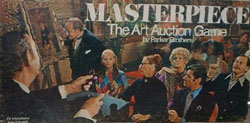Next up was Masterpiece which I have not played in years. Nige has very fond memories of this and astounded us with his recollection of all the character names.
This is a game about buying and selling works of art for a profit (hopefully). Players pieces move around the game board on the roll of a die and each space dictates what you do on that turn. These options range from collecting a sum of money from the bank (which Nige seemed very adept at doing), to buying a painting for a fixed sum of money from the bank or another player, to auctioning off a new painting or one owned by yourself, to selling a painting to the bank. Each painting has a concealed true worth, which only becomes known once you acquire the painting. Hopefully, you’ll find you paid less for it than its worth or you can persuade someone else to buy it to give you a profit or cut your loss. As the paintings circulate around the tables, the more you get to know or deduce about the paintings. The game ends once all the paintings in the bank have been sold or auctioned off, at which stage the true values of the paintings are converted to cash and whoever has the most money wins.
Early in the game, no-one has any idea what the true values of most paintings are, so the auctions are a shot in the dark. Once paintings are changing hands for the second time, you are helped by the fact that the first owner is unlikely to let a painting be sold on for much less than its true worth and will push up the auction price and this is a nice mechanism particularly if you build in the possibility of out-bluffing others in the auction. Towards the end there was a battle royal over the £1m painting (there is only one) and Mark G managed to wrest it from Mark K and force him to accept a loss of about £300k. Nige, however, showed us all that he has a bit of the Lovejoy in him and emerged with a pretty comfortable win.
What cannot go without mention though is the diabolical tactics of various players to gain a profit. Book-keeping is clearly not a strong-point in our club because all of us (I think) managed to try and swindle the bank at some stage in the game - albeit most of us claimed it to be unknowingly. However, John was the banker and the number of times we caught him putting money destined for the bank into his own stash suggests he is not as ‘Honest John’ as he would like us to believe. His ideas on making change for other players defied belief as he gratefully accepted a £1m note from Mark G and gave him two £50k notes in exchange. This blemish on his character will not be forgotten for many moons around these parts.
|

